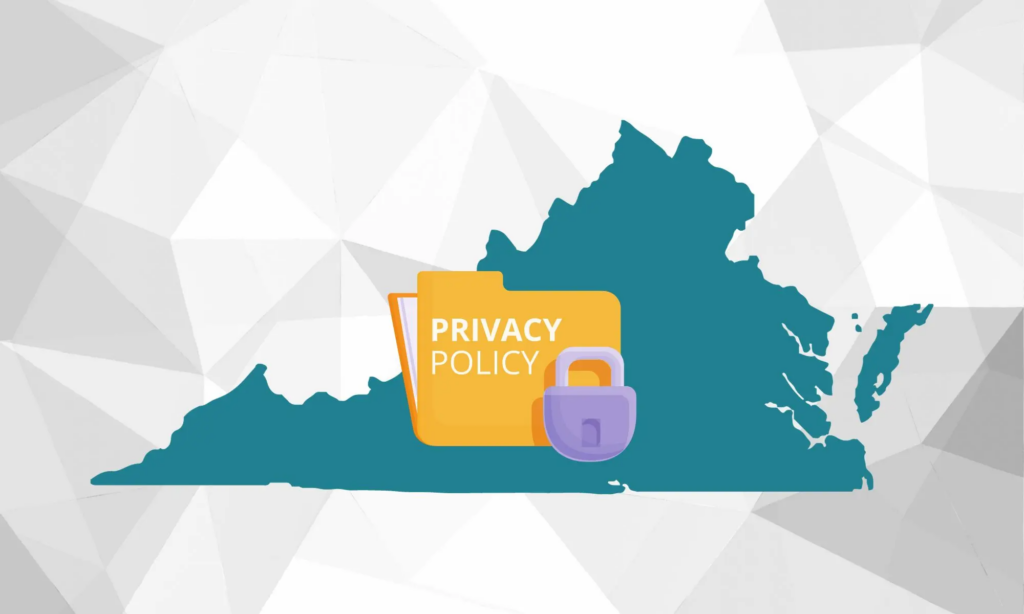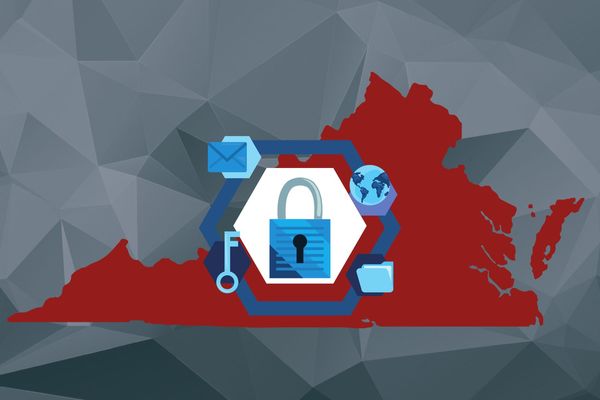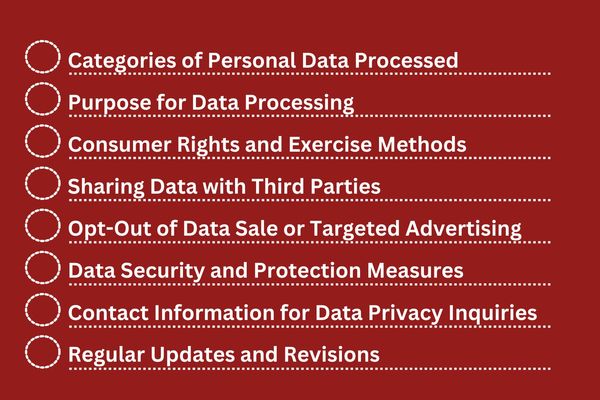
Are you wondering what the VCDPA privacy policy requirements are? These days, you have to get serious about protecting data, or you’ll be in big trouble. This Virginia law lays down some new rules that’ll shake things up. You will now have to have a privacy policy that meets specific criteria, and people will get new rights to control their data, too.
In this article, you’ll get the essentials on how it changes the game for privacy policies, consumer rights, and business responsibilities. It’s tricky navigating all these data privacy rules, but we’ll make sure you’ve got a solid handle on how VCDPA impacts your real-world operations.
Let’s dive into the world of VCDPA and explore how it shapes the landscape of data privacy for businesses and consumers alike.
Key Takeaways
The VCDPA requires businesses to be super clear about their privacy policies, especially when handling regular personal information or VCDPA sensitive data. You must openly say how they get people’s personal data, what you use it for, and who they share it with (among other things).
This law emphasizes data subject rights, giving people control over their own stuff, including consent for using their data. Businesses must make it simple for consumers to take charge of their personal data.
Businesses must keep their policies current and ensure data protection to secure people’s data. They can’t just set it and forget it. Regular updates and strong security are key.
Overview of the VCDPA
Overview of the VCDPA.jpg

The Virginia Consumer Data Protection Act (VCDPA) marks a significant shift in data privacy regulations, particularly for businesses operating in Virginia and those processing Virginia consumer data.
This law, which came into effect on January 1, 2023, mandates a new set of standards for handling personal data. Here’s a more detailed look at what the VCDPA entails:
Your business is applicable to the VCDPA if you produce products or services for Virginians and process 100,000 Virginian’s data in a year or make 50% of gross revenue from 25,000 Virginians.
So what does it say exactly? Well, for starters, you must be clear with Virginians on what data you’re grabbing and why. Lay it all out in a privacy policy people can actually understand. The VCDPA is big on transparency, so people know what’s happening with their data.
You also must be careful who you share data with and how it’s protected to prevent data breaches. The VCDPA makes businesses step up their data security game as well (among many other things).
Bottom line – this is a big shift in personal data for Virginia businesses. Ignoring the VCDPA isn’t an option if you fall under its scope. To stay on the right side of the law, you must open up about data collection, have data protection protocols, and generally treat people’s information with more respect. It’s extra work for sure, but privacy matters.
Does The VCDPA Require a Privacy Policy?
The Virginia Consumer Data Protection Act (VCDPA) does require a privacy policy. This is a key part of the law, and it’s something every business needs to know about.
A privacy policy isn’t just any document. It needs to be clear and easy for people to understand. This policy should tell people what kind of personal data you’re collecting, why you’re collecting it, and who else might get to see this data. It’s all about being open and honest with the people whose personal data you’re handling.
By having a privacy policy, you’re not just following the law. You’re also showing your consumers that you care about their privacy. This can build trust and make people feel more comfortable doing business with you.
VCDPA Privacy Policy Requirements
VCDPA Privacy Policy Requirements.jpg

The Virginia Consumer Data Protection Act (VCDPA) sets specific requirements for the content of privacy policies. Understanding these requirements is crucial for businesses to ensure compliance and maintain transparency with consumers.
Let’s delve into the key elements that must be included in a privacy policy under the VCDPA.
Categories of Personal Data Processed
The VCDPA requires businesses to state the types of personal data they process clearly. This includes any information that can identify a person, like names, addresses, or even online identifiers. It’s important for businesses to review and list all the categories of data they handle.
The goal is the same as the CCPA – to be transparent, and businesses must make sure their privacy policies are easy to get to as well as easy to read. This clarity helps people know exactly what data is being used.
Purpose for Data Processing
Businesses must explain the reasons behind processing personal data. Whether it’s for improving services, marketing, or any other purpose, this needs to be spelled out clearly in the privacy policy.
By being open about the purposes of data processing, businesses can build a stronger trust relationship with their consumers. It reassures consumers that their data is being used responsibly.
The more specific a business can be about the purpose of data processing, the better. This specificity helps consumers understand exactly how their data contributes to the business’s operations.
Consumer Rights and Exercise Methods
The VCDPA law says consumers should be able to control their own data. Businesses have to tell people in their privacy notice that they can access, correct, or delete their data if they want.
It’s not enough to just state the rights; businesses must also provide a clear and reliable way for consumers to exercise these rights. This could be through an online form, email address, or a toll-free phone number.
And if the business says no to someone asking about their data, the VCDPA says they have to explain how the person can fight that decision. The process should be simple so consumers feel empowered.
Sharing Data with Third Parties
Businesses must say if they’re giving customers’ personal information to other third parties. That means saying what kinds of business and what sorts of personal data they’re handing over. The more specifics a business can give on how they share data, the better.
You will need a data processing agreement, and the privacy policy should detail the nature of these agreements, including the scope of data processing and the security measures in place.
Disclosing these agreements in the privacy policy not only complies with the VCDPA but also reinforces the business’s commitment to protecting consumer data, even when third parties manage it.
Opt-Out of Data Sale or Targeted Advertising
If a business sells personal data or uses it for targeted advertising, it must provide a clear and conspicuous way for consumers to opt out of such practices. This disclosure should stand out in the privacy policy, possibly through the use of bold or larger fonts, ensuring that it catches the consumer’s attention.
By providing a straightforward opt-out option, and businesses empower consumers to have control over their personal data, enhancing trust and compliance with the VCDPA.
Data Security and Protection Measures
The VCDPA says businesses must lay out how they protect people’s personal information in their privacy policies, too. That’s so consumers can see what kind of stuff the business does to keep their data safe.
If the business talks openly about stuff like encryption, keeping the data secure, and doing regular checkups on their security, it’ll make people feel better about how safe their personal data is with the business, and it’ll show that your business is taking reasonable steps to ensure data protection.
Contact Information for Data Privacy Inquiries
The Virginia Consumer Data Protection Act says businesses need to make it easy for people to get in touch if they have questions or complaints about data privacy.
The privacy policies must have clear contact info like an email or phone number or a form on their site, and the idea is that if someone’s worried about how their data is getting used, they have someone to talk to.
The business should get back to inquiries without unreasonable delay. Setting up a straight-up privacy contact shows consumers you’re down to talk openly about how their info is handled, which builds trust and transparency in how you use data.
Regular Updates and Revisions
The VCDPA can change a lot over time, as well as your business’s data practices. Businesses have to keep their policies current, showing any differences in how they use people’s personal info.
This might happen because of new services, tweaks in data sharing, or new laws, and it’s not just about making the updates – businesses must also clearly tell consumers about any policy changes.
Doing regular updates and communication is key for businesses to follow the VCDPA and keep their consumers’ trust. Policies aren’t static.
Keeping policies up-to-date and transparently communicating changes to consumers is crucial for businesses to obey the VCDPA and maintain consumers’ trust.
VCDPA Privacy Policy vs CCPA Privacy Policy
When it comes to understanding the differences between the Virginia Consumer Data Protection Act (VCDPA) and the California Consumer Privacy Act (CCPA) or California Privacy Rights Act (CPRA), businesses need to grasp the nuances in their privacy policy requirements.
Here’s a simplified breakdown:
Notice and Disclosure Differences
The VCDPA and CCPA/CPRA are based on Fair Information Practice Principles, which emphasize consumer notification of information practices before personal data collection.
However, they differ in the type, form, and extent of the required notices. For instance, the CCPA requires a privacy policy, notice at the point of collection, and notices about the right to opt out and financial incentives. The VCDPA, on the other hand, streamlines these into a single privacy notice requirement.
Timing of Privacy Notices
Unlike the CCPA, which mandates notices at or before the point of data collection, the VCDPA does not specify when its privacy notice must be provided. This means there’s no explicit requirement for a “just-in-time” notice in Virginia, offering more flexibility to businesses.
Form and Content of Privacy Notices
The VCDPA requires a privacy notice that is “reasonably accessible, clear, and meaningful” but does not provide detailed guidelines on its format. In contrast, the CCPA has specific requirements for online privacy policies, including adherence to industry standards and conspicuous posting on websites.
Content Requirements
The VCDPA privacy notice must include categories of personal data processed, purposes of processing, methods for consumers to exercise their rights, categories of third parties with whom data is shared, and disclosures if personal data is sold or used for targeted advertising.
The CCPA, however, has additional requirements like describing the sources of data collection and metrics on consumer requests.
“Do Not Sell” Button
A significant difference is the CCPA’s requirement for a “Do Not Sell” button on websites, allowing consumers to opt out of the sale of their personal information.
The VCDPA does not require such a button but mandates disclosures in the privacy notice if personal data is sold or used for targeted advertising.
Closing
Navigating privacy laws like that VCDPA thing can be tricky for businesses. It’s not just about understanding the law – you must implement it through taking action on compliance to keep consumers’ data safe. That’s where Captain Compliance comes in to make it easier.
We understand that every business is different, with its own needs and challenges. That is why we offer solutions tailored to you to help understand privacy laws like VCDPA and use them in a way that works perfectly for your business.
Whether it’s writing a policy that follows the rules, providing compliance training to your team for protecting data the right way, or offering outsourced compliance for ongoing support as things change, we’ve got you covered.
Remember, protecting personal data isn’t just a matter of corporate compliance – it demonstrates to your consumers that you care, so they trust you more. So, if you’re feeling overwhelmed or not sure what to do, contact us.
Get in touch with us today and let us guide you through privacy and data so your business can rock it in this data-focused world.
FAQs
What Kind of Data Does VCDPA Protect?
The VCDPA protects Virginian resident’s personal data, which means any info that can identify a person. This includes names, addresses, and even online identifiers.
Note that this only applies to businesses that handle a certain threshold of data and non-exempt entities.
Do you have questions about what data is covered? Check out our detailed guides on personal data protection!
How Should Businesses Update Their Privacy Policies for VCDPA?
Businesses need to update their privacy policies to be clear, honest, and detailed about data use. This includes explaining what data is collected, why, and who it’s shared with.
Need help making your privacy policy? Check out this article to learn how to make one!
Can Businesses Outside Virginia Be Affected by VCDPA?
Yes, if a business handles the personal data of Virginia residents, it must comply with VCDPA, regardless of where it’s located. It’s about protecting Virginians’ data, no matter where the business is.
Unsure if VCDPA affects your business? Reach out to us for more info!
How Does Understanding CCPA Regulations Help with VCDPA Compliance?
Understanding CCPA (California Consumer Privacy Act) regulations can provide a solid foundation for complying with VCDPA. Both laws have similar goals and requirements in data privacy, so knowledge of CCPA can guide you in meeting VCDPA standards. It’s like learning two subjects at once!
Want to get a better grasp of CCPA? Dive into our comprehensive guide on CCPA regulations.